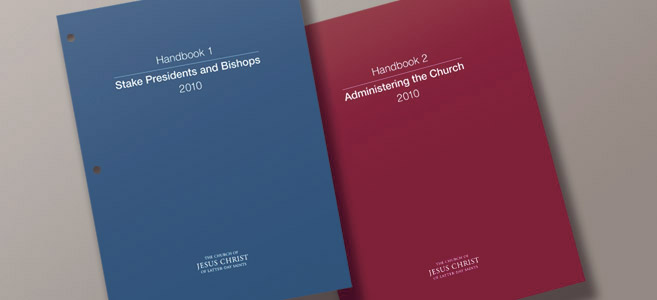Why Handbooks?

Article Highlights
- The handbooks maintain the integrity of Church policies, procedures, and programs throughout the world
- The First Presidency’s burden of resolving procedural issues is lightened by the handbooks
- Local leaders’ ability to administer Church affairs is enhanced as they seek spiritual guidance and refer to the handbooks
“There’s safety in the handbooks.” —President Thomas S. Monson
Related Links
- Read a report from the February 2011 training on how the new handbooks emphasize the work of salvation.
- Read about a panel discussion with the auxiliary general presidencies during the February 2011 worldwide leadership training meeting
- Read a report on the introduction of the new handbooks during the November 2010 training
- Read a report from the November 2010 training on the importance of councils.
As Church leaders introduced two new handbooks and helped explain how to implement the policies therein during two recent worldwide leadership training meetings, they have also answered the question: Why are handbooks important?
Among the many ways the Church’s handbooks may be a blessing are: (1) maintaining procedural integrity during rapid growth, (2) reducing the burden on the First Presidency, and (3) facilitating revelation in local administration.
Integrity and Growth
The handbooks help maintain the integrity of policies, procedures, and programs of a church that is experiencing rapid growth around the world.
“Our membership has been increasing since the Church was organized in 1830. And it will continue to grow with thousands of units throughout the world,” said President Thomas S. Monson during the November 2010 worldwide leadership training meeting. “It would be nearly impossible to maintain the integrity of the policies, procedures, and programs of the Church without these handbooks.”
The First Presidency’s Burden
The handbooks help reduce on the First Presidency the time-consuming burden of answering procedural questions and correcting procedural errors.
“As we of the First Presidency meet together in our regular sessions each week day, we must, of necessity, deal with and correct errors,” said President Monson. “Most of these errors could be avoided if . . . leaders were familiar with the handbooks and followed the policies and procedures outlined therein.”
President Monson said that occasionally well-meaning leaders who are unfamiliar with the policies and procedures of the Church make decisions that lead to potentially harmful aberrations in Church programs.
“Whether you’ve been a lifelong member of the Church or are a relatively new member, consult the handbook when you are uncertain about a policy or procedure,” President Monson said. “There’s safety in the handbooks.”
Facilitating Revelation
The handbooks help facilitate revelation as local leaders seek the guidance of the Spirit in administering Church affairs.
“When leaders of the Church know their duties and follow established procedures, they invite the Holy Ghost to inspire them and the people they are serving,” said Elder Quentin L. Cook of the Quorum of the Twelve Apostles in the November 2010 meeting.
Brother David M. McConkie, first counselor in the Sunday School general presidency, illustrated the importance of the handbooks in the October 2010 general conference.
While being trained as a new stake president by an Area Seventy, Brother McConkie asked a series of questions that, to his chagrin, were all answered in the handbooks.
“I did not venture to ask any more questions. I thought it best to read the handbook,” Brother McConkie said. “It is contrary to the economy of heaven for the Lord to repeat to each of us individually what He has already revealed to us collectively” (“Gospel Learning and Teaching,” Liahona and Ensign, Nov. 2010, 13).
To find video, text, and audio of the November 2010 and February 2011 worldwide leadership training meetings in 40 languages, visit the Serving in the Churchsection of ChurchofJesusChrist.org.
